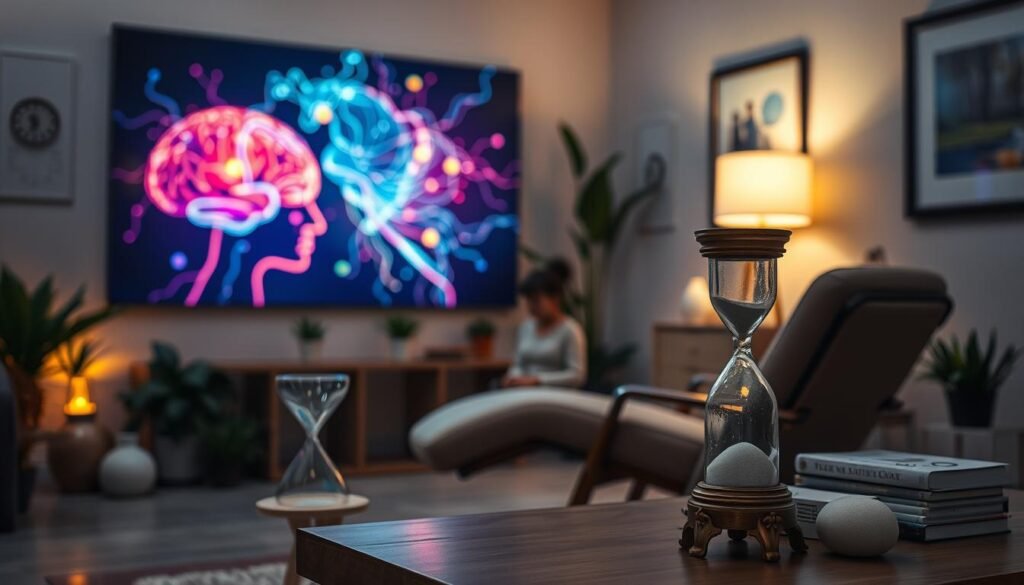Every year, about 40 million adults in the United States battle with anxiety disorders. This makes it a major mental health issue in the country. The need for effective solutions is critical, and hypnosis is emerging as a key option. Often known as hypnotherapy for anxiety, it leads to deep relaxation and makes people more open to suggestions for change.
Studies show hypnosis can deeply cut down on anxiety, offering hope to those struggling. This article will dive into how hypnosis helps with anxiety disorders. It will look at the science behind it and new methods that can help people feel better.
Key Takeaways
- Hypnosis can significantly reduce anxiety symptoms for many individuals.
- Hypnotherapy is recognized as an effective adjunct to traditional therapeutic interventions.
- Licensed practitioners enhance the safety and effectiveness of hypnotherapy.
- Self-hypnosis techniques offer accessible methods for managing anxiety daily.
- Research supports the benefits of hypnosis for not only anxiety but also conditions like depression and insomnia.
Understanding Hypnosis and Its Applications
Many people want to know more about hypnosis. It’s a powerful psychological tool used in many ways. It has come a long way from its early days to now being a key part of therapy.
Definition of Hypnosis
Hypnosis is all about deep focus, being open to suggestions, and relaxing. The term hypnosis definition shows it can help people change for the better and deal with mental health issues. It lets people see thoughts and experiences in a new way, making it great for therapy.
Common Uses in Therapy
In therapy, hypnosis helps with anxiety, fears, sadness, and trouble sleeping. It can really make a person’s mood better. A study in 2019 found that hypnosis lowered anxiety by over 79% compared to those who didn’t try it. It’s used for everything from everyday anxiety to helping those with cancer, providing a whole-person approach to taking care of mental health.
Hypnotherapy vs. Stage Hypnosis
It’s important to know how hypnotherapy and stage hypnosis differ. Hypnotherapy is used by skilled professionals for healing. Stage hypnosis, on the other hand, is for fun, with people doing funny acts under hypnosis. Hypnotherapy is caring and helps with personal growth. But stage hypnosis might not help psychologically and can give people the wrong idea about what hypnosis really is.
| Aspect | Hypnotherapy | Stage Hypnosis |
|---|---|---|
| Purpose | Therapeutic, aimed at healing | Entertainment, focused on performance |
| Practitioner | Licensed mental health professional | Entertainer or performer |
| Environment | Clinical or private setting | Public stage or event |
| Outcome | Behavioral change and psychological relief | Humor and audience amusement |
| Approach | Supportive and individualized | Generalized and scripted |
How Effective is Hypnosis in Treating Anxiety?
A lot of scientific evidence hypnosis anxiety research shows hypnosis helps reduce anxiety. Studies have consistently shown it can decrease symptoms. This makes a strong argument for using it in therapy. Researchers have looked into how well hypnotherapy works in treating anxiety disorders. They have found it to be very effective.
Scientific Evidence Supporting Hypnosis for Anxiety
In 2017, a big study looked at 20 smaller studies on cancer patients and anxiety. It found that hypnosis really helped reduce their anxiety. This important study opened the door for more research. A 2019 study combined 15 studies and found hypnosis cut anxiety by 79% on average. This proves hypnosis can be a powerful tool for mental health.
Recent Studies and Findings
More recent studies continue to support hypnosis as a holistic treatment for anxiety. In 2020, a study showed that a 15-minute hypnosis session quickly reduced anxiety in patients with severe COPD. This shows that hypnosis can help with various health issues. It often works alongside other treatments to make them more effective.
Potential Mechanisms Behind Hypnosis and Anxiety Relief
To understand how hypnosis helps with anxiety, we need to know how it affects the mind. It puts people in a relaxed but focused state, making them open to positive suggestions. This helps stop negative thoughts and build confidence. Hypnosis is especially good for helping people manage generalized anxiety and social anxiety. They feel more in control of their emotions. Plus, Solution Focused Hypnotherapy uses positive talks during a calming hypnosis to find good solutions for better mental health.

| Study Year | Participants | Anxiety Reduction |
|---|---|---|
| 2017 | 20 studies (cancer patients) | Significant improvement |
| 2019 | 15 studies | 79% average reduction |
| 2020 | Patients with COPD | Immediate improvement |
Hypnosis Techniques Used for Anxiety
Many hypnosis methods help people with anxiety. They bring calm and control your emotions. You can try guided relaxation, visualization, and self-hypnosis. Each one offers unique ways to handle anxiety better.
Guided Relaxation Techniques
With guided relaxation, a hypnotherapist takes you through relaxation steps. You’ll imagine peaceful scenes. This helps change how you react to anxiety and feel more at ease.
Visualization and Suggestion Methods
Visualization uses your imagination to find peace. It helps you forget what makes you anxious. During hypnosis, you get suggestions to think differently about stress. This builds better ways to cope with anxiety.
Self-Hypnosis Practices
Self-hypnosis lets you manage anxiety on your own. You learn to relax deeply. Then, use that state to encourage good habits through imagery or positive statements. This technique gives you immediate stress relief tools, improving your mood over time. With practice, you’ll get much better at controlling your anxiety.
| Technique | Description | Benefits |
|---|---|---|
| Guided Relaxation | Led by a hypnotherapist, focusing on relaxation exercises. | Enhances emotional control, reduces stress. |
| Visualization | Using mental imagery to promote relaxation and coping. | Detaches from anxiety triggers, fosters a calming mindset. |
| Self-Hypnosis | Individual practice of relaxation techniques. | Provides independence in managing anxiety symptoms. |
Using these hypnosis techniques can make a big difference in handling anxiety. You can learn more and feel better. For deeper insights into hypnosis for anxiety, check out this article on psychologytoday.com.
Benefits of Hypnotherapy for Anxiety Disorders
Hypnotherapy provides great benefits for people facing anxiety disorders. It helps along with other treatments, making them more effective. Research has been focusing on how hypnotherapy can help with anxiety, according to a study.
Complementing Traditional Treatments
Hypnotherapy is a good addition to standard therapies like CBT. Adding hypnosis to a treatment plan can lead to better and quicker results. This approach combines various therapies to produce a stronger effect against anxiety.
Improving Emotional Control and Reducing Anxiety Symptoms
Hypnotherapy is excellent for improving emotional control. In sessions, people find a deep sense of calm. This calm reduces anxiety’s physical signs like fast heartbeat and tight muscles.
It uses suggestion therapy to change negative thoughts and boost confidence. This helps lower anxiety symptoms. Studies show hypnosis can cut anxiety by up to 79% when compared to non-hypnotized individuals.
Enhancing Coping Strategies
Hypnosis helps people learn coping strategies to deal better with stress. It teaches how to face stress, trauma, or difficult people. Through desensitization, hypnosis increases resilience to anxiety triggers. This leads to better control over one’s emotions.

Risks and Considerations of Hypnosis
Hypnosis has many benefits for treating anxiety. However, it’s important to know the risks involved. Some people may not be good candidates for hypnotherapy. Knowing this helps ensure it’s used safely.
Who Should Avoid Hypnosis?
People with serious mental health issues like psychosis, hallucinations, or schizophrenia should steer clear of hypnosis. The risks of hypnosis are higher for those abusing drugs or alcohol. Assessing a patient’s mental health first is key to avoid making things worse.
Potential Side Effects
Side effects hypnotherapy can range from mild to severe. While many feel relaxed, others might feel anxious, uncomfortable, or confused after. In rare cases, hypnosis may cause false memories, especially if the practitioner isn’t trained well. It’s important to weigh these potential risks against the benefits.
Importance of Professional Guidance
It’s crucial to have professional guidance in hypnotherapy to lower its risks. Certified hypnotherapists know whom it will work for, can tailor treatments, and handle any negative effects. Certification varies by state, so checking a hypnotherapist’s credentials before treatment is wise.

Comparative Efficacy: Hypnosis vs. Other Therapies
Hypnosis and CBT are both used to treat anxiety disorders, but they work in different ways. Hypnosis focuses on relaxation and suggestions, while CBT works on changing negative thought patterns. This makes it important for people to understand both to choose the best therapy for them.
Contrasting Hypnosis with Cognitive Behavioral Therapy (CBT)
CBT is widely used for anxiety and mental health issues. It helps people change bad thought habits. Hypnotherapy, on the other hand, uses relaxation and suggestions to ease anxiety. Studies show hypnosis can quickly help people, especially those with chronic pain. This makes it a good option when CBT doesn’t work well. Research also proves hypnotherapy is effective in managing pain and some phobias.
Alternative Therapies for Anxiety Management
There are many other therapies for anxiety besides CBT and hypnotherapy. Rapid Transformational Therapy (RTT), for example, aims to solve deep psychological issues quickly. It’s proven effective for anxiety, depression, addiction, and pain management. Therapies like Neuro-Linguistic Programming (NLP) and Virtual Reality (VR) therapy also show promising results. Each therapy offers unique benefits and focuses on meeting individual needs. With the right professional, any of these methods can lead to positive, long-term change. They highlight why it’s crucial to explore and choose the right therapy for your anxiety challenges.
Integrating Hypnosis into a Comprehensive Treatment Plan
Adding hypnosis into a full treatment plan can greatly improve care for anxiety disorders. Working together, mental health pros develop a plan that’s just right for each person. This plan is tailored to fit every individual’s unique situation.
Collaboration with Mental Health Professionals
Mental health pros are key in making integrated hypnosis work well and safely. They mix hypnotherapy with other treatments for the best results. This team approach helps them understand each patient better. It also leads to the best mental health outcomes.
With experts like psychologists, psychiatrists, and counselors on board, patients get all-around support. This support tackles the root issues of their anxiety disorders directly.
Creating a Personalized Approach
To get the most out of hypnotherapy, a customized approach is critical. Every patient’s anxiety is different, needing its own plan. Sessions are made to fit what each person needs and likes. This might include guided imagery or suggestions.
Having regular check-ins lets therapists see how things are going. They can change the hypnosis plan as needed to keep improving the patient’s mental health.
| Key Components | Role in Treatment |
|---|---|
| Collaboration with Mental Health Professionals | Facilitates a comprehensive understanding of anxiety and improves treatment outcomes. |
| Personalized Hypnotherapy Approach | Tailors techniques to individual needs, enhancing engagement and effectiveness. |
| Follow-up Sessions | Allows for ongoing assessment and adjustment of treatment plans based on progress. |
Future Directions in Hypnosis Research
Research in hypnosis is changing fast. Studies now look at how it can be more effective for patients. They test new methods and treatments in hypnotherapy to help more people.
Scientists are going beyond old uses of hypnosis. They’re exploring its power to fix tougher mental and physical problems. This is pushing the boundaries of what we thought possible.
Emerging Studies and Innovations in Treatment
New research offers exciting insights into how hypnosis works in the brain. People who respond well to hypnosis show big changes in their brain activity. This happens especially in the medial prefrontal cortex.
Using neuroimaging, scientists can now see how hypnosis changes brain connections. This could lead to more effective hypnosis techniques. These advances help create treatments that really hit the mark.
Potential for Broader Applications
Hypnosis is proving useful in many areas, beyond what we knew. It helps with anxiety, pain, PTSD, and irritable bowel syndrome. It often works better than usual treatments.
Mental health experts are starting to use hypnosis more. It could be big in healthcare, mixing with traditional medicine to improve patient care. To learn more, check this overview of hypnosis and its effects on anxiety and heart health.
Conclusion
The evidence in this article shows that hypnosis can help with anxiety. Scientific studies and real-life use prove hypnosis as a helpful tool for managing anxiety and improving emotional control. It works even better when combined with methods like Cognitive Behavioral Therapy (CBT).
Hypnotherapy offers more than just quick fixes. It can make lasting changes in people’s lives who deal with anxiety. Studies show hypnosis might be better than traditional approaches in some cases. This shows the great potential of hypnotherapy in mental health.
As new research comes out, it’s important for doctors and patients to keep up with hypnotherapy’s progress. Hypnosis for anxiety disorders is a field full of hope for better mental health.